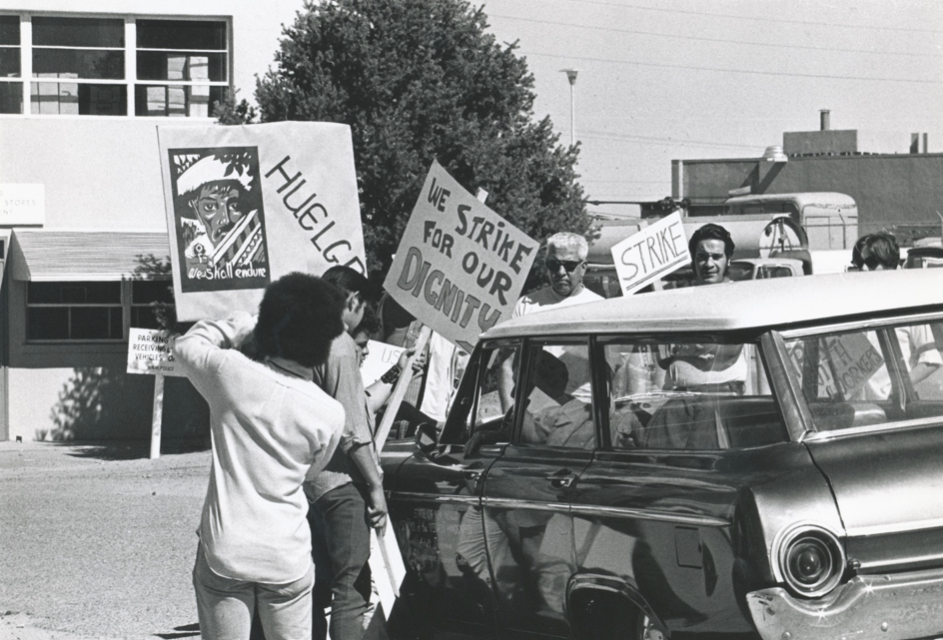
Adolfo Padilla
1969
Myron Fifield ran the Physical Plant at the University of New Mexico. In September 1969, a series of strikes ensued at the Physical Plant to protest the injustice of chicano’s wages and their employment at the plant. They believed that they were unfairly paid to perform the same tasks, which put them at the poverty line at the time and not having any Hispanic-Americans in any supervisory or managerial position in Fifield’s 10 years as head of the plant suggested his reluctance to promote people of Hispanic background. In the beginning, they had some evidence to back their claim of discrimination in the workplace provided by the United Mexican-American Students, or UMAS. A man named Adolfo Padilla and the ongoing battle with the Physical Plant would catapult the fight for the rights of Hispanic-Americans to successfully equalizing working and pay rights despite the person’s ethnic background.
The Chicano Movement of the 60s and 70s was a social struggle waged by Americans of Mexican origin for equal rights. Most of the big stuff happened in cities like Los Angeles and San Diego, where police brutality was at its harshest, with the killing of innocent Mexican-Americans, or “chicanos”, the reduced pay for the same work, higher education, voting rights, and even restoration of land grants. The Chicano Movement had been brewing since the mid 19th century, however, since the Treaty of Guadalupe Hidalgo was signed by Nicholas P. Trist whose credentials are revoked four months prior, the treaty was never really a treat (it was a proposal), and the United States of America didn’t want to recognize their own signature on the proposal when a newer protocol is written to strike two articles out of the original treaty. The striking of these two articles would allow the United States to utilize land discussed in the already mentioned Treaty of Guadalupe Hidalgo. Once supposedly protected land under the “treaty” is now being infringed on and Mexican-Americans all over the country began to feel upset because which piece of legislature do they follow if both have the United States’ signature, but have contradictory laws? This wildfire of events from killing to land-grabbing spread throughout the Southwest and eventually ended up in our school, where it serve as a landing platform to discuss our student population’s opinions on the individual rights of Mexican-American students, such as Adolfo Padilla and his job.
Adolfo Padilla, a man who would start the change that this University needed, was not friends, to say the least, with Fifield. Padilla wanted overtime at the library and since he was employed at the Physical Plant, he needed approval by Fifield. Padilla worked four days a week at the University and, because of his terrible wages, worked as a farmhand on the weekends. Fifield wrote in his memo in 1969 that “In his mind he justified this because of the low salary we were paying”, which means he knew he was paying him next to nothing. Then, even already working everday of the week, Padilla asked Fifield for overtime at the library. Fifield denied it stating “I tried to answer him and explain that I t took a while for a leading man to build up trust to the point where he felt he could turn a man loose for overtime by himself”. By the way, there were two other men who were getting overtime who had been working under Fifield for the same amount of time as Padilla.
This next part is really what got UMAS’ blood boiling. Fifield described Padilla as someone “that was obviously ‘hopped up’ on something. I did not smell liquor, and he did not act like a man who was drunk. He acted, however, like a man who was doped or otherwise exceedingly agitated—almost to the point where he was an irrational human being”. Why is this a big deal? Well the Chicano Movement was now encompassing most of the Southwest also dealt with social discrimination and stereotyping like ideas where all people of Mexican origin were drug traffickers, moving drugs from Mexico to USA. A full on case was then served to President Heady in which UMAS demanded several important and game-changing inequalities to be corrected including increased wages, the rehiring of all ten employees recently fired for no apparent reason, and Ad-Hoc committee, and, finally, the resignation of Fifield.
Matthew Hunter, Biology, ‘20
Further Reading:
“UMAS, the Cops and UNM, November, 1969”, University of New Mexico Vertical Files (UNMA 006), Center for Southwest Research, University Libraries, University of New Mexico.
“MEMO TO FILE, September 29, 1969”, University of New Mexico Vertical Files (BOX 26), Center for Southwest Research, University Libraries, University of New Mexico.
Photo:
Wildcat Strike – Physical Plant workers and student supporters. 1970. Photographer unknown, Photo courtesy of the Center for Southwest Research, University of New Mexico.
